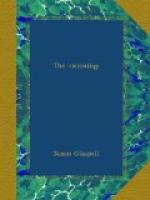Wayne had undertaken the supervision of Ann. In his first letter, that unsatisfactory letter in which he gave so few details about finding Ann, he had said quite high-handedly that he was going to look after things himself. “I think, Katie,” he wrote, “that with the best of intentions, your method was at fault. I can see how it all came about, but it is not the way to go on. It was too unreal. The time of make-believe is over. Ann is a real person and should work out her life in a real way, her own way, not following your fancyings. She must be helped until she gets stronger and more prepared. You’ve had the thing come too tragically to you to see it just right, so I’m going to step in and I want you to leave things to me.”
So Wayne had “stepped in” and was lending Ann the money to study stenography. Katie had made a wry face over stenography, which did not have a dream-like or an Ann-like sound—but a very Wayne-like one!—but had entered no protest; at that time she had been too dumbly miserable to enter protest about anything.
Wayne seemed to her curt and rather unfeeling about the whole thing, insisting, somewhat indelicately, she thought, on the point that Ann be prepared to earn her own living and that there be no more nonsense about her. She hoped he was kinder with Ann than he sounded in his letters about her.
Ann was in New York. Wayne had said, and Katie agreed with him, that Chicago was not the place for her to start in anew. She had gone through too many hard things there. And Katie was glad for other reasons. With Wayne in Washington, she would have no more occasion to be in the middle-west and Ann would be too far away in Chicago.
But Katie was looking desperately homesick at that thought of having no more occasion to be in the middle-west.
The man who mended the boats was still out there, mending boats and finishing his play, which she knew now was to be about the army. One reason he had wanted to mend boats there was that he might know some of the men who worked in the shops at the Arsenal, interested in that relation of labor to militarism.
For two months Katie had heard nothing from him. In those first months he, too, seemed helpless before it, seemed to understand that Katie’s feeling was a thing he could not hope to understand—much less, change.
Then there rose in him the impulse to fight, for her, against it all, stir her to fight.
“Katie,” he wrote in that first letter, letter she was re-reading that night, “we have seen two sides of the same thing. Our two visions, experiences, have roused in us two very different emotions. Does that mean it must kill for us what we have said is the biggest emotion—experience—the greatest joy and brightest hope life has brought us?
“We’re both bound by it. I by the hurt it’s brought me, you by the happiness; I by the hate it roused, you by the love that lingers round it. Are we going to make no efforts to set ourselves free? Are we so much of the past that the institutions of the past and the experiences and prejudices of those institutions can shut us out from the future and from each other?




